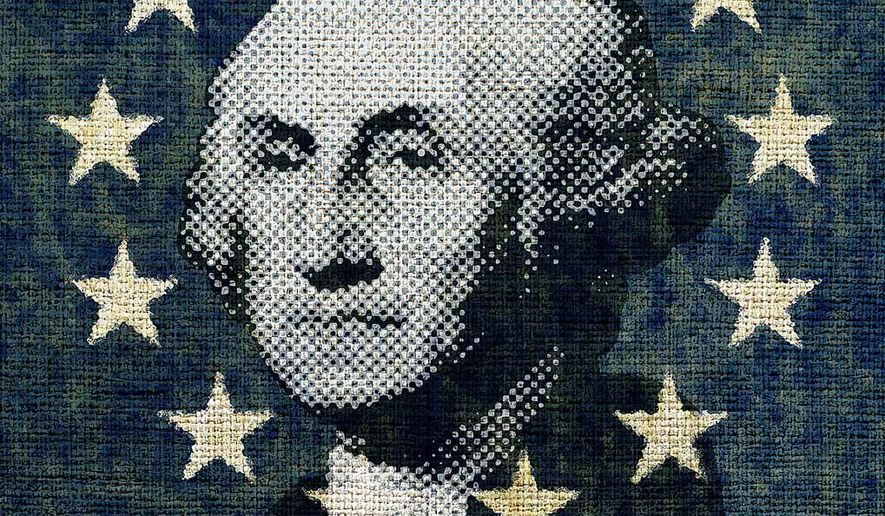OPINION:
We live in difficult times that “try men’s souls,” as Thomas Paine famously put it during the Revolutionary War. “The summer soldier and the sunshine patriot will, in this crisis, shrink from the service of his country,” he warned.
However, then most Americans responded by pledging their lives, property and even “sacred honor” to the cause of independence. From their sacrifice emerged the United States of America, and what became an extraordinary history of an exceptional country. We need the same commitment and dedication today.
We should turn for inspiration to George Washington, the Revolution’s military commander and nation’s first president. What made him extraordinary was not just what he did, but what he did not do: accept the crown that many people were prepared to offer. He was a true republican, dedicated to “one nation under God, indivisible, with liberty and justice for all,” as Americans declare in the Pledge of Allegiance.
Washington helped bring a new nation through stormy times. The United States was not the dominant power that it is today, but a weak country, disunited at home and disregarded abroad. He knew Americans could not succeed alone. Which is one reason he believed in the role of divine providence. The colonies enjoyed God’s favor. How else to explain how the undisciplined, rag-tag soldiers who constituted the Continental Army defeated the world’s greatest power?
On April 30, 1789, Washington was inaugurated as America’s first president. The U.S. Constitution had superseded the Articles of Confederation as the former colonists embarked upon a grand new political adventure. He offered this prayer:
“Almighty God; we make our earnest prayer that Thou wilt keep the United States in Thy holy protection, that thou wilt incline the hearts of the citizens to cultivate a spirit of subordination and obedience to government; and entertain a brotherly affection and love for one another and for their fellow citizens of the United States of America at large. And finally, that Thou wilt most graciously be pleased to dispose us all to do justice, to love mercy and to demean ourselves with that charity, humility and pacific temper of mind which were the characteristics of The Divine Author of our blessed religion, and without whose example in these things we can never hope to be a happy nation. Grant our supplication, we beseech thee, through Jesus Christ Our Lord, Amen.”
This is a prayer that Americans, whatever their political or religious beliefs, should repeat today.
Surely the United States would benefit from “holy protection.” We live in a dangerous world. Our courageous military personnel are at constant risk. Even non-believers should want to safeguard those who put their lives on the line for the rest of us.
George Washington certainly was correct that the success, even survival, of America as a republic ultimately depends upon the “hearts of the citizens.” Critical is obedience — to legitimate, elected authority, not obsequious surrender to the sort of despotism against which the colonists revolted. Equally important is “brotherly affection and love” for our neighbors, with whom we are building a common home.
Finally, who could dispute the importance of Americans possessing a good heart — to “love mercy” and exhibit “that charity, humility and pacific temper” characteristic of God? Whatever may be our individual religious beliefs, living up to the central principles that President Washington described would make America “a happy nation.”
This is the point that is missed by those who disparage religion or patriotism: All Americans should share the same objectives: to work together to build a better country; to promote a political order which protects liberty and encourages virtue; to create a society in which our children and grandchildren continue to progress in their lives.
Americans start with different worldviews. Some of us are believers, some are not. Some of us are Christians, some of us hold other faiths. Some of us were born in America, some emigrated to the United States. Some of us live in cities, some in the suburbs and some on farms. We favor different sports teams and hold different political opinions. But we are all Americans.
Most important is what brings us together. It is building a common home that acts as a “city on a hill” abroad, as President Ronald Reagan so eloquently declared. We should focus on these tasks as we face new and difficult challenges.
Now is not the time for summer soldiers and sunshine patriots. Instead, we need those who love mercy, practice charity and exhibit humility to step forward. Most important, we must call on continued divine protection for this great land. Only if God continues to shed his grace on America can Americans continue to promote the blessings of liberty around the world.
• Edwin Meese III, who served as attorney general in the Reagan administration, is a board member of the American Civil Rights Union.




Please read our comment policy before commenting.